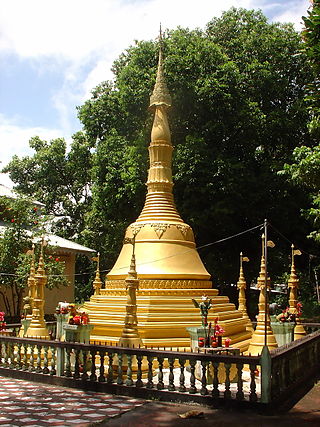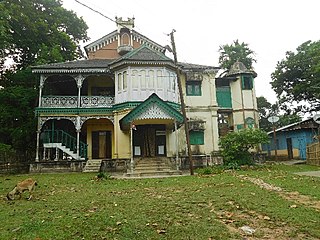Related Research Articles

Buddhism is the third-largest religious affiliation and formed about 0.63% of the population of Bangladesh. It is said that Buddha once in his life came to this region of East Bengal to spread his teachings and he was successful in converting the local people to Buddhism, specially in the Chittagong division and later on Pala empire propagate and patronized Buddhist religion throughout the Bengal territory. About 1 million people in Bangladesh adhere to the Theravada school of Buddhism. Over 65% of the Buddhist population is concentrated in the Chittagong Hill Tracts region, where it is the predominant faith of the Rakhine, Chakma, Marma, Tanchangya, other Jumma people and the Barua. The remaining 35% are Bengali Buddhists. Buddhist communities are present in the urban centers of Bangladesh, particularly Chittagong and Dhaka.

Pramathesh Chandra Barua was an Indian actor, director, and screenwriter of Indian films in the pre-independence era, born in Gauripur, Dhubri, Assam.

Devdas is a 1935 Bengali film directed by Pramathesh Barua and based on the Sharat Chandra Chattopadhyay novel, Devdas. It stars Barua as Devdas, Jamuna Barua as Parvati (Paro) and Chandrabati Devi as Chandramukhi. This was Barua's first of three language versions of the story, the second being in Hindi and the third in Assamese. The Bengali film was dubbed into Tamil and was released in 1936. K. L. Saigal sang two songs in Tamil for this film.(See Ext. links for a link.)

Barua is a common Assamese surname shared by the Assamese communities much like Aroras of Punjab.

Beldanga [বেলডাঙ্গা ]is a municipality town under the Berhampore subdivision of Murshidabad district in the state of West Bengal, India. Beldanga is an important trade centre of this district.
Gauripur is a semi-urban town under Gauripur Town Committee in the Dhubri district in the state of Assam, India.

Barua is a Bengali-speaking Magh ethnic group who lives in Chittagong Division in Bangladesh, West Bengal in India and Rakhine State in Myanmar, where they are known as the Maramagyi or Maramagri or particularly the Magh Barua. According to Arakanese chronology, the Barua Buddhists have lived there for five thousand years. The word 'Barua' was formed of Arakanese words Bo and Yoya. Literally, Barua means the place where an army chief resides. Later on, the people who lived in such locality or village also gradually came to be known as Barua. In Myanmar, Barua Maghs are classified as one of the seven ethnic groups that make up the Rakhine nation. In West Bengal (India), Barua Magh Buddhist Community is recognized as Scheduled Tribe (ST). The physical characteristics of Barua (Maramagyi) people are Mongolian, their stature is low, face is broad and flat, cheekbones high and wide, nose flat and bridgeless, and eyes small with eyelids obliquely set. Their list of favourite foods invariably includes shnutki machhor(dry fish), sea fish and spicy food prepared with lots of oil and chilli, Gudog with bamboo shoots. Different kinds of shnutki an indication of their origin can be identified. For instance, according to multiple respondents the Siddala and Hangor shnutki are consumed by this particular Arakanese community. Borga (pork) is the most commonly consumed meat by the Barua Magh community.

Hem Barua was a prominent Assamese poet and politician from Assam.

Pratima Barua Pandey was an Indian folk singer from the royal family of Gauripur in Western Assam's Dhubri district. Barua Pandey, a national awardee, best known for her Goalpariya songs Hastir Kanya and Mur Mahut Bandhure, was the daughter of Prakritish Chandra Barua (Lalji) and niece of filmmaker Pramathesh Barua of Devdas fame.
Khargram is an assembly constituency in Murshidabad district in the Indian state of West Bengal. It is reserved for scheduled castes.

Birendranath Sircar was an Indian film producer and the founder of New Theatres Calcutta. He made Bengali-language films that were noted for introducing many film directors who later became famous. He was awarded the Dada Saheb Phalke Award in 1970 and the third highest civilian award in India, the Padma Bhushan, in 1972.
Bhattadeva (1558–1638), is acknowledged as the father of Assamese prose. Though Bhaktiratnakar-katha, the Assamese translation of Sankardev's Sanskrit composition Bhaktiratnakar by Gopala Charana Dwija preceded the works of Bhattadeva, Bhattadeva's prose had an influence in the development of a high and dignified style. Bhattadeva's and Gopala Charana Dvija's 16th century works are considered to be the earliest examples of prose in Indian languages. Bhattadeva's erudition in Sanskrit grammar and literature, and his command over the Bhagavata earned him the title of Bhagavata Bhattacharya.
Ananda Chandra Barua (1907–1983) was a writer, poet, playwright, translator, journalist and actor from Assam. He is popularly known as Bokulbonor Kobi in Assamese literacy society. He was honoured with, most notably the Padma Shri title and Sahitya Akademi award.

Matiabag Rajbari or Matiabag Palace is located in Gauripur in Dhubri district of Assam. The palace was built by Raja Prabhat Chandra Barua of the Gauripur royal family on a small hill-top at Matiabagh, Gauripur on the banks of the Gadadhar river. It was the royal guest house and summer residence (Hawakhana) by the royal family of Gauripur, also known as ‘Rangamati Baruas. The construction of the palace began in 1904 and was completed by 1914. The palace was built by Chinese carpenters from China Town in Kolkata at a cost of ₹ 340000, the palace features elements of Hindu, Mughal and British architecture.
Atul Chandra Barua was the 46th president of Asam Sahitya Sabha and a prominent name in the modern Assamese literature. He was an ACS officer and an Assamese writer. He worked for the cause of Darrangi culture and was conferred with the title "Darrang Ratna".
Dinesh Chandra Chattopadhyay was a Bengali writer and editor.
The Pal family are a Bengali aristocratic family who historically held lands in what is now Sylhet, Bangladesh.
References
- ↑ Dalal, Roshen (2014). Hinduism: An Alphabetical Guide. Penguin UK.
- ↑ Barua, Dāsa, Harendranath, Yogeśa (1992). Reflections on Assam, 1944-1983: a collection of writings. Harendranath Barua Memorial Society. p. 75.
{{cite book}}: CS1 maint: multiple names: authors list (link) - ↑ Datta, Amaresh (1987). Encyclopaedia of Indian Literature. Sahitya Akademi. p. 480.